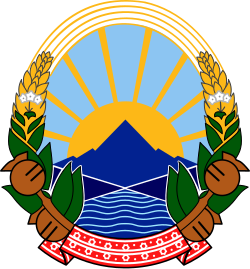Parties and coalitions
Fourteen political parties and coalitions contested the election, having submitted candidate lists for MPs in at least one of the six constituencies within the country and the three in the diaspora. Three among them, namely, VMRO-DPMNE, SDSM and DUI, submitted their candidate lists in all nine constituencies. [10]
VMRO-DPMNE
The VMRO-DPMNE-led coalition consisted of 22 parties: VMRO-DPMNE, the Socialist Party of Macedonia (SPM), the Democratic Union (DS), Democratic Renewal of Macedonia (DOM), the Democratic Party of Turks (DPTM), the Democratic Party of Serbs in Macedonia (DPSM), the Union of Roma in Macedonia (SRM), the United Party for Emancipation (OPE), the Party of Justice (PP), the Party of the Democratic Action of Macedonia [ sv ] (SDAM), the Party of the Vlachs of Macedonia (PVM), the Party for Integration of the Roma [ mk; sv ] (PIR), the Bosniak Democratic Party [ sv ] (BDP), Democratic Forces of the Roma [ mk; sv ] (DSR), Permanent Macedonian Radical Unification [ mk ] (TMRO), the New Liberal Party [ mk ] (NLP), the People's Movement for Macedonia [ mk ] (NDM), VMRO–Democratic Party [ mk ], VMRO-United, Fatherland's Macedonian Organisation for Radical Renewal–Vardar–Aegean–Pirin [ mk ] (TMORO–VEP), Macedonian Alliance [ mk ] (MA), and VMRO–Macedonian. [11]


